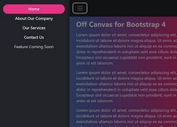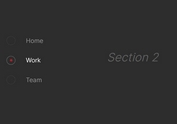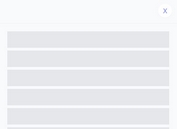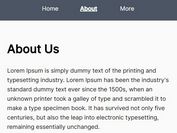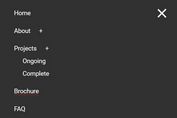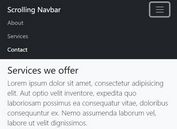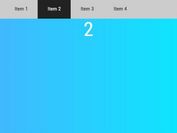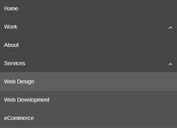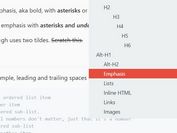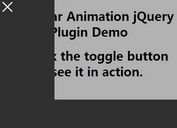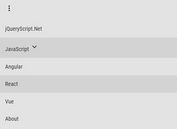Off-canvas One Page Scroll Navigation In jQuery
| File Size: | 3.11 KB |
|---|---|
| Views Total: | 2185 |
| Last Update: | |
| Publish Date: | |
| Official Website: | Go to website |
| License: | MIT |

A fancy hamburger button to toggle an off-canvas menu that enables the visitor to smoothly scroll through fullscreen page sections by clicking the anchor links.
How to use it:
1. Create content sections for the one page scroll web app.
<div class="content" id="main"> <h2>Page Section 1</h2> </div> <div class="content" id="news"> <h2>Page Section 2</h2> </div> <div class="content" id="feedback"> <h2>Page Section 3</h2> </div> <div class="content" id="maps"> <h2>Page Section 4</h2> </div> <div class="content" id="contacts"> <h2>Page Section 5</h2> </div>
2. Make the sections fullscreen.
.content {
width: 100%;
height: 100vh;
display: flex;
justify-content: center;
align-items: center;
}
3. Create the off-canvas navigation. Note that the anchor links must point to their corresponding sections as follows:
<div class="burger">
<span></span>
<span></span>
<span></span>
</div>
<div class="menu">
<span class="btn btn-close">×</span>
<ul>
<li><a href="#main">Page 1</a></li>
<li><a href="#news">Page 2</a></li>
<li><a href="#feedback">Page 3</a></li>
<li><a href="#maps">Page 4</a></li>
<li><a href="#contacts">Page 5</a></li>
</ul>
</div>
4. The necessary CSS styles for the off-canvas navigation.
* {
transition: all 0.2s;
}
.burger {
width: 50px;
height: 50px;
border-radius: 100%;
background: #FFFFFF;
position: fixed;
top: 20px;
left: 30px;
display: flex;
flex-direction: column;
justify-content: center;
align-items: center;
z-index: 98;
}
.burger span {
height: 2px;
width: 20px;
background: black;
margin: 2px;
}
.burger:hover {
cursor: pointer;
}
.burger:hover span:first-child {
width: 10px;
transform: rotate(33deg) translate(6px, 0px);
}
.burger:hover span:last-child {
width: 10px;
transform: rotate(-33deg) translate(6px, 0px);
}
.menu {
width: 20%;
height: 100vh;
background: #000000;
display: flex;
justify-content: center;
align-items: center;
z-index: 99;
position: fixed;
top: 0;
left: 0;
transform: translateX(-100%);
transition: all 0.4s;
}
.menu_active {
transform: translateX(0%);
transition: all 0.4s;
}
.menu .btn-close {
position: absolute;
top: 20px;
right: 20px;
text-align: center;
font-size: 25px;
line-height: 20px;
height: 25px;
width: 25px;
color: purple;
padding: 0;
border: 0;
}
.menu .btn-close:hover {
color: purple;
transform: rotate(180deg);
}
.menu ul {
list-style-type: none;
}
.menu ul li {
margin: 10px;
font-size: 25px;
}
.menu ul li a {
color: #ffffff;
text-decoration: none;
}
.menu ul li a:hover {
color: purple;
}
5. Load the needed jQuery JavaScript library at the end of the document.
<script src="https://code.jquery.com/jquery-3.3.1.min.js" integrity="sha384-tsQFqpEReu7ZLhBV2VZlAu7zcOV+rXbYlF2cqB8txI/8aZajjp4Bqd+V6D5IgvKT" crossorigin="anonymous"></script>
6. The jQuery script to activate the off-canvas navigation.
$(document).ready(function() {
var menuLink = $('.burger');
var menu = $('.menu');
var close = $('.btn-close');
var navLink = $('ul li a');
var content = $('.content');
menuLink.click(function() {
menu.toggleClass('menu_active');
});
close.click(function() {
menu.toggleClass('menu_active');
});
navLink.on('click', function(event) {
event.preventDefault();
var target = $(this).attr('href');
var top = $(target).offset().top;
$('html, body').animate({scrollTop: top}, 500);
menu.toggleClass('menu_active');
});
content.click(function() {
menu.toggleClass('menu_active');
});
});
This awesome jQuery plugin is developed by wp-kurila. For more Advanced Usages, please check the demo page or visit the official website.
